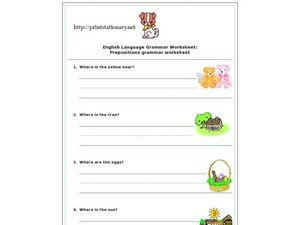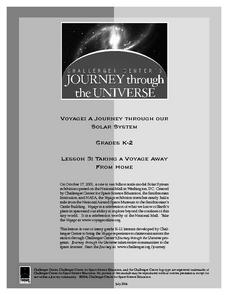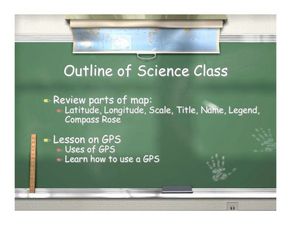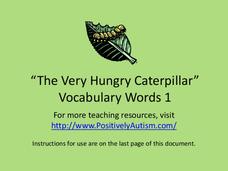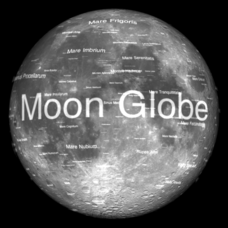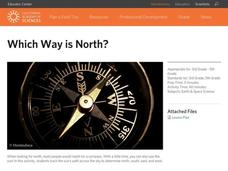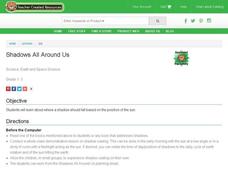Curated OER
Heavens Above
Students study the stars and their positions. In this astronomy lesson students see how scientists can predict the positions of the stars and can tell how they would have appeared in the past.
Curated OER
Sun Path: Interactive On-line Mac or PC
Students use SunPath in the yearly mode to investigate seasonal changes in sunrise, sunset, length of day and sun altitude at their own latitude. Sun Path JAVA applet uses equations for a spherical Earth to calculate the sunrise and...
Curated OER
Our Solar System
Students study the Earth and Solar System through a variety of activities. They compile a coloring book show the characteristics of the Sun and nine planets.
Curated OER
Making a Solar Eclipse Book: The Sun and Moon During a Solar Eclipse
Students make book covers displaying the Sun during a solar eclipse and a labeled illustration of the Sun.
Curated OER
Solar System
Second graders create planet mobiles in order to reinforce concepts such as planet size, position in relation to the sun, and planet names.
Curated OER
English Language Grammar Worksheet: Preposition Grammar Worksheet
In this grammar worksheet, 1st graders look at five different pictures and use positional words to answer 5 questions about where the objects are located.
Curated OER
Taking a Voyage away from Home
Learners experience and participate in a journey through a "Voyage" exhibition of the Solar System and the frontier it covers. They build a dynamic model of the Earth and Sun. Descriptions are given on the relative sizes of the Sun and...
Curated OER
Sun Shadow Cycles
Students use diagrams to review how the Earth rotates around the sun. In groups, they use the same diagrams to explain how the sun shadows are produced and how they differ between seasons. They describe the Earth's rotation and...
Curated OER
Creative Position Word Center Activity
Students use positional words to describe the location of objects and demonstrate the ability to follow multi-step oral directions. Seasonal shapes are decorated in relation to the directions and positions stated by the positional word.
Curated OER
Problematic Situation For A Raisin In the Sun
Students explore the different perspectives within the text. In this language arts lesson, students read A Raisin in the Sun and discuss what they would do if they were in the same position as the Younger family.
Stanford University
Solstice and Equinox Season Model
How can December 21 be the shortest day of the year when all days are 24 hours long? Pupils see how to build a model showing the differences between winter and summer solstices and equinoxes. Using this model, classes can then discuss...
Global Oneness Project
Ancient and Modern Worlds
The old aphorism, "The road to Hell is paved with good intentions," might well serve as the title for a resource that asks viewers to consider the plight of the people of the Gamo Highlands, an area in southwestern Ethiopia. These...
Curated OER
The Web of Life
Students construct a food web to learn how living things in an ecosystem are interconnected. In this food web simulation lesson, students will be assigned an animal and the teacher will represent the sun. Students and teacher discuss...
Curated OER
Lesson on GPS
Students investigate global positioning systems. For this technology and mapping lesson, students view a PowerPoint presentation in which they identify the features of a GPS, state its uses, and follow steps to find a waypoint.
Curated OER
Taking the Measure of the Universe
Four fabulous activities immerse amateur astronomers into measuring objects that we cannot handle. The experiences are applied to NASA's Space Interferometry Mission, which will take measurements of planets around stars other than our...
Science 4 Inquiry
Phases of the Moon
The moon takes just over 27 days to orbit around Earth. Young scientists position themselves as the earth as they rotate around the sun and hold the moon. This allows them to observe the patterns and phases of the moon.
California Academy of Science
Kinesthetic Astronomy: Mars Opposition Dance
Your class will watch as one child orbits the sun as Earth, while another orbits as Mars. If the timing is right, they will see the repetitive dance between the two planets and discover how often they are opposite from each other. For...
Positively Autism
The Very Hungry Caterpillar Vocabulary
Moon, eggs, leaf, sun, caterpillar. Prior to reading Eric Carle's classic tale, introduce vocabulary for The Very Hungry Caterpillar with these picture cards that also include the vocabulary word printed in large type.
Midnight Martian
Moon Globe
Not just a simple globe of the moon, this interactive version allows you to choose lighting according to the location of the sun, views from different positions on Earth, and more! Satellite images and topographic data have been combined...
Curated OER
An Introduction to the Night Sky and Movement Astronomy
Basically, this is an interactive exploration of educational astronomy software and an app. Young astronomers discover how the apparent motion of the sky relates to Earth's movements and the position of the observer. It is out of this...
Star Date
Modeling the Night Sky
Dramatize the stars and planets as they become a visual representation of the solar system in this activity. Young astronomers track and simulate various constellations as they orbit the Earth to learn the position and motion of...
California Academy of Science
Which Way is North?
Who needs a compass to find cardinal directions? Just place a stick in the ground and record the movement of its shadow over the course of a day. Then, measure the shadow lengths in order to determine a north-south line. A simple...
Curated OER
Shadows All Around Us
Young scholars create shadows. In this shadow casting lesson, students read books about shadows, view a demonstration on shadow casting and then practice shadow casting on their own. Young scholars cast a shadow using the position of the...
Curated OER
Space Science
Eighth graders study the objects in our solar system. In this space lesson plan students identify and describe planets, then classify them as terrestrial or gaseous.





